COMITE CIENTÍFICO DE LA OROP_PS APRUEBA PROPUESTA DEL IREA
EMBARCACIONES PESQUERAS COMO PLATAFORMAS CIENTÍFICAS
IREA ESTARÁ A CARGO DE GRUPO DE TRABAJO INTERNACIONAL DE LA OROP-PS PARA EL USO DE EMBARCACIONES PESQUERAS COMO PLATAFORMAS CIENTÍFICAS.
El IREA (Pedro Trillo, Presidente y Francois Gerlotto Director Científico) participó en el 2do. Comité Científico de la OROP_PS realizado en Honolulu entre el 1 y 7 de octubre del 2014.
El IREA propuso, fundamentó y obtuvo la aprobación de un Grupo de Trabajo para establecer la Normalización y Protocolos para el uso de datos acústicos de las embarcaciones pesqueras con fines científicos.
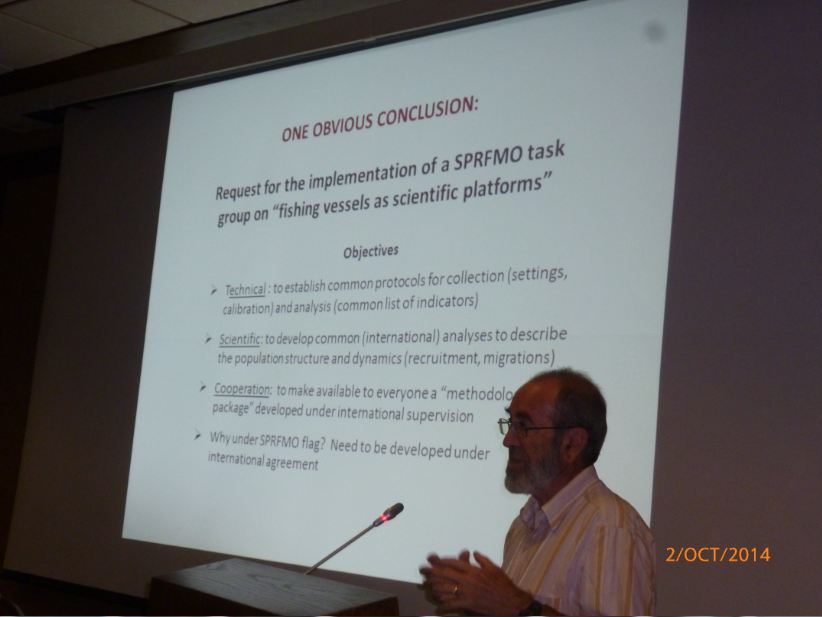
francois gerlotto director científico del irea sustenta la propuesta del irea
Aquí la traducción de un extracto del Reporte del II SC-SPRFMO, que reseña la participación del IREA en este importante evento:
Quote
" (...)
Dr. Pedro Trillo del Instituto de Recursos Acuáticos IREA (Perú) presentó el trabajo realizado por su Instituto y de interés para la South Pacific Regional Fisheries Management Organisation SPRFMO. Destacó las actividades que lleva a cabo en relación con el jurel, por ejemplo, el Taller Internacional en 2013 en Manta, Ecuador, el Taller Internacional sobre “Embarcaciones Pesqueras como Plataformas Científicas” en Lima, Perú 2014, y la publicación de un número especial de la revista Fisheries Research. Además, el Instituto está involucrado en estudios en curso sobre el uso de los buques de pesca como plataformas científicas (por ejemplo, el Big Data Project de la Pesquería Peruana, y la consulta propuesta por Francois Gerlotto que sigue a continuación bajo el numeral 6.5)"
"(...)
6.5. Programa futuro de investigación sobre el jurel e identificación de las necesidades de investigación y evaluación a corto plazo.
Mayor uso de datos acústicos dependientes de la pesca.
Se solicitó al Comité Científico establecer un Grupo de Trabajo sobre la Normalización de los datos acústicos de las embarcaciones pesqueras con los siguientes objetivos:
● Establecer protocolos comunes (ajustes de los instrumentos y procedimientos de calibración; definición de indicadores; etc)
● Desarrollar enfoques de colaboración para brindar aportes para un enfoque ecosistémico para la evaluación y el suministro de información ecológica y pesquera a la Organización de Ordenamiento Pesquero del Pacífico Sur OROP_PS ( South Pacific Regional Fisheries Management Organisation SPRFMO.)
● Desarrollar un "paquete metodológico" para que los usuarios potenciales procesen sus propios datos bajo un formato internacional acordado.
El Grupo de Trabajo se propuso durante tres años bajo la presidencia de François Gerlotto (IREA). La participación estará abierta a todos los Miembros interesados, CNCPS y Observadores. Se fomentará también la incorporación de especialistas en acústica.
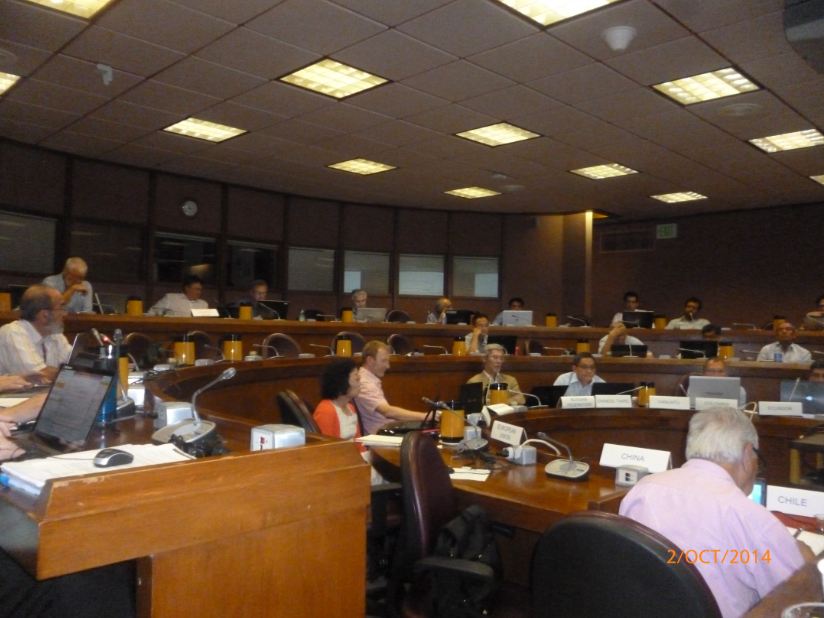
2da. reunión del comité científico de la orop_ps (honolulu, 2014)
El programa de trabajo del Grupo de Tarea seguirá las recomendaciones del Taller sobre "Embarcaciones Pesqueras como Plataformas Científicas” . El Grupo de Trabajo realizará un Taller anual y el trabajo entre períodos de sesiones a través de medios de comunicación a distancia. Para el primer año, se recomendó que el Grupo de Tarea se dedique al desarrollo de un protocolo de calibración de las embarcaciones pesqueras.
El Grupo de Trabajo debería informar al Comité Científico SPRFMO y trabajar en colaboración con el WGFAST CIEM y el Comité Asesor Internacional del IREA para evitar la duplicación y asegurar la calidad científica de sus trabajos.
Las actividades del Grupo de Tarea se apoyarán en IREA (a través de su trabajo regular) y por las ya comprometidos contribuciones de las empresas pesqueras. Otras fuentes de financiación se están explorando. Los gastos de viaje al Taller Internacional anual serán cubiertos por los participantes."
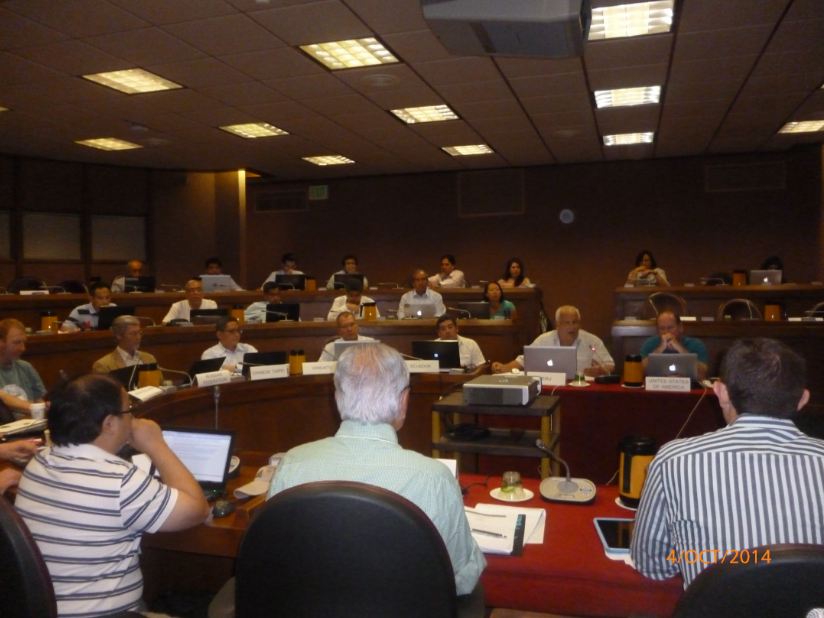
científicos de la orop_PS debatiendo
Enlace al Reporte en su versión original en inglés:
Speech by Pedro Trillo in the Second Meeting of the Scientific Committee of the SPRFMO (Honolulu, 2014)
Good Morning let me to introduce myself: I am Pedro Trillo president of the Aquatic Resource Institute IREA (Instituto de Recursos Acuáticos). I take this opportunity to thank Jim Ianelli, president of the SPRFMO Scientific Committee for having invited me as invited expert to this meeting.
The organization we created with some scientist from different countries of the world, the IREA, has been created in order to promote the inclusion of economic agents and social actors in the process of scientific knowledge, regardless of nationality or country of origin. We wanted it to be independent in such a way that it can conceive and develop very quickly activities that are needed by the scientific communities but that are not always easy to develop in official institutions for many reason that I will not detail here.
In order to describe us, the best is probably to give some examples of our works that were made possible thanks to the active support of many of our friends who are present in this room.
For instance we organized in January 2013 an International Workshop on Jack Mackerel in Manta, Ecuador, with the objective to present the state of the art of research on jack mackerel to our Ecuadorian colleagues and define with them what would be the best actions to undertake in this country on this rather new and unstable resource.
Another example is to have participated during eight months with twenty seven researchers of the Instituto del Mar del Peru in the edition of the special issue of the journal that Jorge Csirke presented yesterday on the jack mackerel.
Following the recommendation of the Research Program of the Scientific Committee, we also organized in Lima an international workshop on fishing vessels as scientific platforms that will be presented by Francois Gerlotto and we have constituted an editorial board with Gary Melvin from Canada, and Carolina Lang from IFOP in Chile, and Jorge Csirke as independent consultant to produce a special issue of Fisheries Research on this topic, to be published in the course of 2015, which will be also presented by Francois.
About our present activities, we are engaged with the SNP in the organization of a side event to the COP20 summit in Lima in December on the project of constituting an international group around the idea of “fishing vessels as sentinels of the ocean”. This proposal is based on the same idea of fishing vessels as scientific observers, but with the wider objective to be the sentinel instantly informing the community on any change or shift in the ecological condition of the seas. I will be pleased to comment this point later with anybody interested in this project.
But what I would like to detail a bit more is what we called the Big Data Project of the Peruvian Fisheries. This project is based on the huge amount of environmental information fishing vessels are producing constantly and that are underexploited so far for several reasons. We all know that the data constitute the lifeblood of scientific knowledge, and especially in the framework of ecosystem approach to fisheries, environmental data are essential for the understanding of the fish populations.
We have to face three major challenges when building the Big Data project. At first the protocols and metrics to be collected in order to get pertinent indicators should be defined and scientific validation process applied to the data input of the fishing Vessels. For such task we come to ask your support to this initiative that Francois will briefly explain.
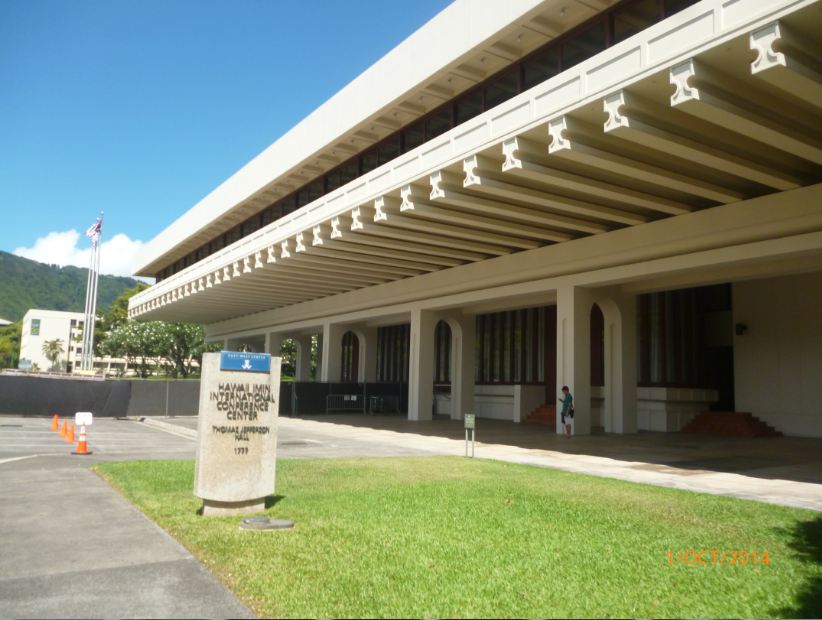
east.west international convention center, honolulu
Second the process of raw material of echo soundings of around forty vessels represents terabytes of data. To give an example, during the Jack mackerel fishing season in Peru the fishery produces more than two hundred times the amount of acoustic information collected during one survey of a research vessel. And if we consider the anchovy fishery, this could be more likely thousand times. Our way to overcome this difficulty is to involve two universities in Lima at the beginning and to extend to others in the country where we will install what we call Halieutic laboratories with the objective to help the fishing companies represented by the National Fisheries Society (SNP) to process their raw material data.
The third challenge is to design and develop a strong Data Base with software to output reports in real time and Apps to improve the time to collect and share the reports. In this case we may count on the IBM and the faculty of Informatics of the Scientific University of the South in Lima. But we need to get the input of experts in data base architecture and of users of these data base for a better definition of its features.
But this is the future of our activities. For the present ones I leave you with Francois Gerlotto who is the Scientific Director of IREA.
II Scientific Committee Meeting-SPRFMO, October 2dn, 2014
East.West InternatiIonal Convention Center, Honolulu, Hawaii, USA
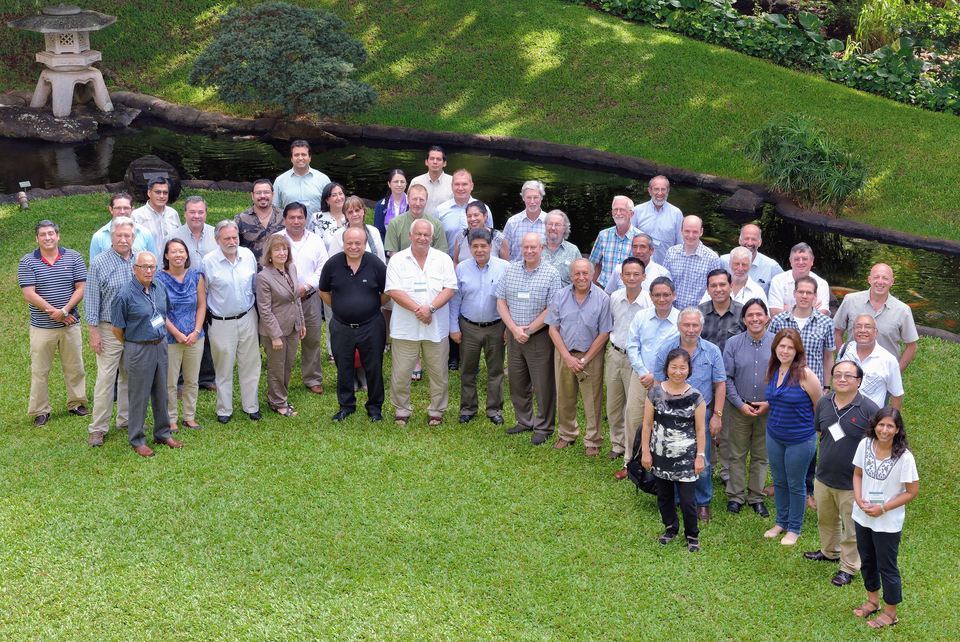
foto grupal de los asistentes a la 2da. reunión del comité científico de la orop_PS (honolulu, 2014)
Escrito por
Publicado en
Conservación de la biodiversidad y aprovechamiento sostenible de los recursos acuáticos y los ecosistemas que los contienen



